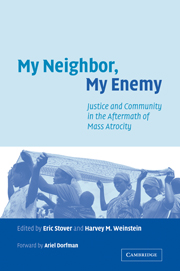Book contents
- Frontmatter
- Contents
- List of contributors
- Foreword by Ariel Dorfman
- Acknowledgments
- Introduction: conflict, justice and reclamation
- Part I Institutional approaches to justice
- Part II Social reconstruction and justice
- 7 Neighbors again? Intercommunity relations after ethnic cleansing
- 8 Memory, identity, and community in Rwanda
- 9 Attitudes toward justice and social reconstruction in Bosnia and Herzegovina and Croatia
- 10 Connecting justice to human experience: attitudes toward accountability and reconciliation in Rwanda
- 11 Public education and social reconstruction in Bosnia and Herzegovina and Croatia
- 12 Confronting the past in Rwandan schools
- Part III Survivors and justice
- Conclusion: a common objective, a universe of alternatives
- Index
7 - Neighbors again? Intercommunity relations after ethnic cleansing
Published online by Cambridge University Press: 05 May 2010
- Frontmatter
- Contents
- List of contributors
- Foreword by Ariel Dorfman
- Acknowledgments
- Introduction: conflict, justice and reclamation
- Part I Institutional approaches to justice
- Part II Social reconstruction and justice
- 7 Neighbors again? Intercommunity relations after ethnic cleansing
- 8 Memory, identity, and community in Rwanda
- 9 Attitudes toward justice and social reconstruction in Bosnia and Herzegovina and Croatia
- 10 Connecting justice to human experience: attitudes toward accountability and reconciliation in Rwanda
- 11 Public education and social reconstruction in Bosnia and Herzegovina and Croatia
- 12 Confronting the past in Rwandan schools
- Part III Survivors and justice
- Conclusion: a common objective, a universe of alternatives
- Index
Summary
How can survivors of wars inflamed by ethnic hatred rebuild their lives? How do they describe their former enemies, now their neighbors? What role does justice play in the process of rebuilding communities? And what will it take to re-establish trust among former neighbors torn apart by communal violence?
In the summer of 2000, we set out to answer those questions through a series of long-term studies in three war-ravaged cities in Bosnia and Herzegovina (Mostar and Prijedor) and Croatia (Vukovar). As Weinstein and Stover have noted in the Introduction to this volume, these cities, once vibrant and thriving urban centers, are now deeply divided along ethnic lines. While the “ethnic divide” in Mostar is facilitated by the River Neretva, with Bosniaks living on the east bank and Croats living on the west bank, neither Vukovar nor Prijedor has such a physical demarcation. Instead, a “psychological wall” exists in both these cities, separating Croats from Serbs in Vukovar, and Bosniaks from Serbs in Prijedor. In all three cities, people from opposing ethnic groups who once lived together peacefully now harbor deep-seated resentments and suspicions of one another, making it difficult to renew social relationships or to form new ones.
Our studies examined the views of residents in these three cities regarding war, justice, and the prospects for reconciliation. In Mostar and Vukovar, we studied the daily lives of residents over a two-year period.
- Type
- Chapter
- Information
- My Neighbor, My EnemyJustice and Community in the Aftermath of Mass Atrocity, pp. 143 - 161Publisher: Cambridge University PressPrint publication year: 2004
- 30
- Cited by



